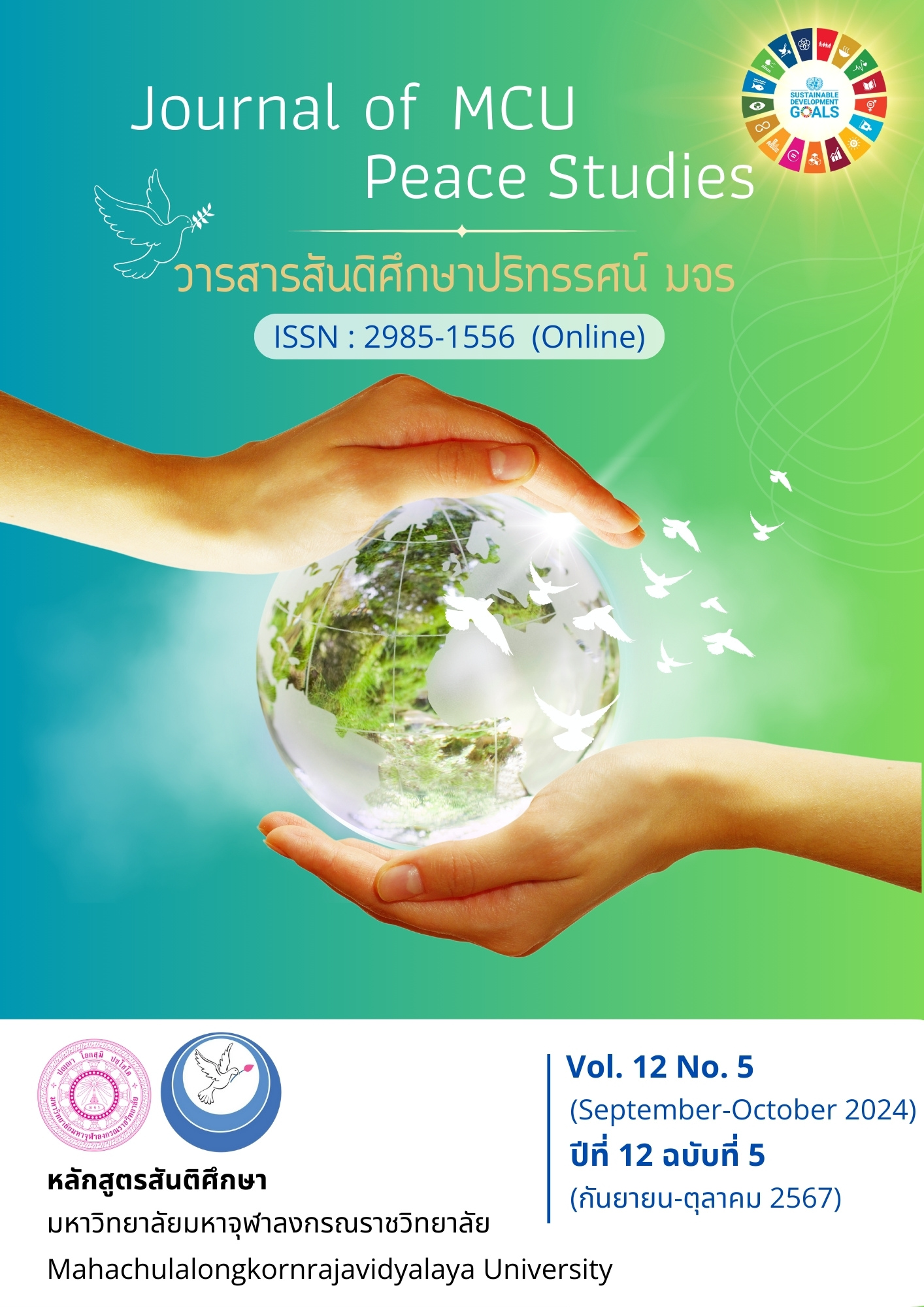การจัดประสบการณ์เรียนรู้โดยใช้เกมการเล่นเพื่อส่งเสริมความสามารถในการใช้กล้ามเนื้อใหญ่สำหรับเด็กปฐมวัย
Main Article Content
บทคัดย่อ
การวิจัยครั้งนี้มีวัตถุประสงค์เพื่อเปรียบเทียบความสามารถในการใช้กล้ามเนื้อใหญ่ของเด็กปฐมวัยก่อนและหลังการการจัดประสบการณ์เรียนรู้โดยใช้เกมการเล่น กลุ่มตัวอย่างเป็นนักเรียนชั้นอนุบาล 1 จำนวน 8 คน จากโรงเรียนอนุบาลนานาชาติแห่งหนึ่งในกรุงเทพมหานคร ซึ่งได้มาจากการสุ่มตัวอย่างแบบง่าย (Simple Random Sampling) เครื่องมือที่ใช้ในการวิจัยประกอบด้วยแผนการจัดประสบการณ์การเรียนรู้ โดยใช้เกมการเล่นจำนวน 8 แผน ซึ่งผ่านการตรวจสอบความตรงเชิงเนื้อหาและหาประสิทธิภาพได้ค่าดัชนีความสอดคล้อง (IOC) เท่ากับ 1.00 และมีค่าประสิทธิภาพ 86.67/88.89 และแบบสังเกตพฤติกรรมความสามารถในการใช้กล้ามเนื้อใหญ่ ซึ่งผ่านการตรวจสอบความตรงเชิงเนื้อหาได้ค่าดัชนีความสอดคล้อง (IOC) เท่ากับ 0.67-1.00 การวิเคราะห์ข้อมูลเชิงพรรณนาเกี่ยวกับความสามารถในการใช้กล้ามเนื้อใหญ่ของเด็กปฐมวัยก่อนและหลังการจัดประสบการณ์เรียนรู้ โดยใช้ค่าสถิติพื้นฐาน คือค่าเฉลี่ย () และค่าเบี่ยงเบนมาตรฐาน (S.D.) เพื่ออธิบายลักษณะของข้อมูล และการวิเคราะห์ข้อมูลเชิงอนุมานเพื่อเปรียบเทียบความสามารถในการใช้กล้ามเนื้อใหญ่ของเด็กปฐมวัยก่อนและหลังการจัดประสบการณ์เรียนรู้ โดยใช้สถิติ t-test แบบ dependent samples
จากการศึกษาเรื่อง การจัดประสบการณ์เรียนรู้โดยใช้เกมการเล่นเพื่อส่งเสริมความสามารถในการใช้กล้ามเนื้อใหญ่สำหรับเด็กปฐมวัย พบว่า การจัดประสบการณ์การเรียนรู้โดยใช้เกมการเล่นส่งผลให้ความสามารถในการใช้กล้ามเนื้อมัดใหญ่อยู่ในระดับดี และความสามารถในการใช้กล้ามเนื้อมัดใหญ่หลังการจัดประสบการณ์เรียนรู้สูงกว่าก่อนการจัดประสบการณ์เรียนนี้อย่างมีนัยสำคัญทางสถิติที่ระดับ 0.05 ซึ่งแสดงให้เห็นว่าเกมการเล่นมีส่วนช่วยในการพัฒนากล้ามเนื้อใหญ่ของเด็กปฐมวัยได้อย่างมีประสิทธิภาพและสนุกสนาน
Article Details

อนุญาตภายใต้เงื่อนไข Creative Commons Attribution-NonCommercial-NoDerivatives 4.0 International License.
ทัศนะและความคิดเห็นที่ปรากฏในบทความในวารสาร ถือเป็นความรับผิดชอบของผู้เขียนบทความนั้น และไม่ถือเป็นทัศนะและความรับผิดชอบของกองบรรณาธิการ ยินยอมว่าบทความเป็นลิขสิทธิ์ของวารสาร
เอกสารอ้างอิง
Bureau of Health Promotion, Department of Health, Ministry of Public Health. (2020). Handbook for Promoting Early Childhood Development 3-4 Years Old. Agricultural Cooperative Federation of Thailand., LTD.
______. (2021). Handbook for Promoting Early Childhood Development 4-5 Years Old. Agricultural Cooperative Federation of Thailand., LTD.
Horadarn, A. (2017). Physical Development of Early Childhood: Guidelines for Promotion and Development. Journal of Education Studies, 10(1), 100-112.
Jeeradechakul, D. (1998). Children's Play. Bangkok: Odeon Store.
Jinakart, P. (2007). The Effects of Organizing Experiences with Cooperative Traditional Play Games (Team Pair Solo) on Physical Fitness (Gross Motor) of Early Childhood Children at Banphalad School, Lampang Province. (Master's Thesis). Lampang Rajabhat University. Lampang.
Limsupreearat, P. (2006). Conditions and Problems of Playground Management in Kindergarten Schools. (Master's Thesis). Chulalongkorn University. Bangkok.
Mason, J. (1982). Play and Learning: Perspectives on Early Childhood Education. London: Croom Helm.
Ministry of Education. (1999). National Education Act B.E. 2542 (1999) and Amendment (No. 2) B.E. 2545 (2002). Bangkok: Kurusapha Ladprao.
______. (2017). Early Childhood Education Curriculum B.E. 2560 (2017). Bangkok: Agricultural Cooperative Federation of Thailand, LTD.
Nahuanin, Ch. et al. (2020). The Use of Thai Children's Play Activities to Promote Gross Motor Development for Early Childhood. Eastern Asia University Academic Journal (Science and Technology), 10(1), 186-196.
Pansang, D. (2008). The Effects of Yoga Movement Activities on the Physical Development of Early Childhood. Journal of Sports Science and Health, 9(2), 7-16.
Pattanajureepan, M. (2004). The Effects of Using Educational Games by Teacher Guidance and Self-Play Methods on the Interest and Development of Kindergarten 2 Children at Burasiri School, Mueang District, Surin Province. (Master's Thesis). Surin Rajabhat University. Surin.
Piaget, J. (1962). Play, Dreams and Imitation in Childhood. New York: Norton.
Sueblinvong, T. (2008). Guidelines for Conducting Research Ethics in Humans. Journal of the Thai Researchers Association, 23(2), 1-10.
Suwannawong, P. (1985). An Experimental Study of Using Games in Teaching Thai Language to Fourth Grade Students. (Master's Thesis). Srinakharinwirot University. Bangkok.
Thorndike, E. L. (1975). Connectionism Theory. London: University of London.
Wat Vajiralongkorn Wararam School. (2017). Early Childhood Education Curriculum B.E. 2560 (2017). Nakhon Ratchasima: Office of Nakhon Ratchasima Primary Educational Service Area 4.
Yaowapattana, C. (2000). Games. Bangkok: Chulalongkorn University Press.


